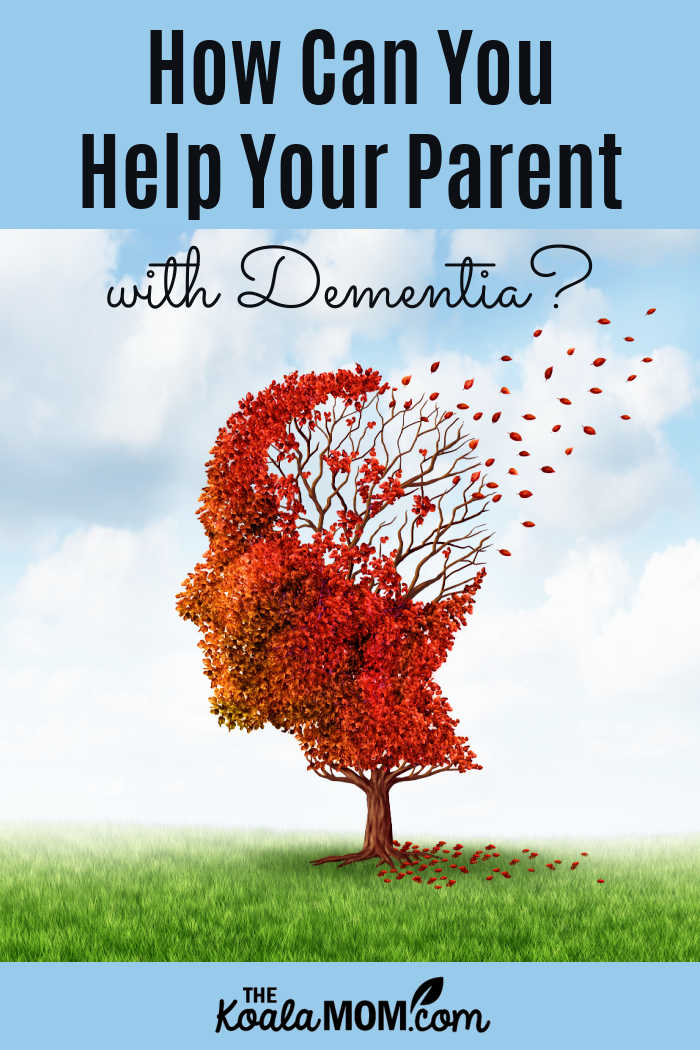Caring for a parent with dementia can be an emotionally taxing experience, but you are not alone. Millions of people worldwide are faced with the same reality and they too feel overwhelmed by it. Though there is no one-size-fits-all remedy, we have compiled some tips that might help make your loved one’s life easier to manage. This blog post will provide tips on how you can help a parent with dementia.

Understand the basics of dementia
As a caregiver, it’s important to have at least a basic understanding of dementia so you can provide the best possible care for those with this condition.
Dementia is an umbrella term that describes an illness affecting brain function and causing a gradual decline in memory, reasoning, communication skills, and problem-solving abilities. This progressive deterioration can make it difficult to understand complex concepts or perform activities of daily living. Alzheimer’s disease is the most common form of dementia.
To maximize the quality of life for those affected by dementia, health professionals suggest maintaining routines and providing clear instruction so they can focus on areas they are still able to do or engage with others in meaningful activities. Communication techniques such as speaking slowly in simple language and focusing on the present can help these individuals interact without overwhelm.
It takes effort to understand the basics of dementia but the rewards are worth it when we show we care.
Learn how to communicate with a person with dementia
Communicating with a person who has dementia can be challenging, but there are techniques to better support their needs and make the overall experience beneficial. The biggest challenge is understanding that meaning may not always be obvious in what the person is saying. To make sure you’re reaching the right understanding, focus on using a calm, gentle tone of voice—as if you were speaking to a child.
Also, keep in mind that patience is important when engaging in conversation with someone who has dementia; it’s best to limit distractions from other conversations or loud noises so the person can focus solely on listening and responding. While it might take more time for them to formulate their words, remain interested and engaged in what they have to say, as it helps build trust and acceptance between the two of you.
When my grandma was in the middle stages of her dementia and could still communicate, we’d often have the same conversation over and over again. She’d forget that she had already asked me about whether we’d been skiing this year, or if I wanted tea, or where my daughter was going to school. After one such visit, my oldest daughter expressed frustration that great-Grandma kept asking her the same questions over and over again.
It required a lot of patience to keep answering that question, but I was grateful that my grandma could still express such an interest in my life and have that conversation with me, even if she promptly forgot the answer. As her dementia progressed, her ability to communicate also diminished, and one-sided conversations were even more difficult that repeated conversations.
Consider sending them to a dementia home
When making the decision to send a loved one to a dementia home, it is paramount that all of the available options are thoroughly researched. While no solution will be free of difficult choices, it is important to keep in mind that dementia home care is staffed by knowledgeable and caring professionals who believe in providing quality dementia care.
Knowing that your family member is in good hands can provide substantial peace-of-mind, and make what can be a difficult transition easier. Ultimately, your goal should be to select a facility with competent staff, excellent amenities, and an atmosphere of comfort and security; one that truly specializes in providing top-notch care for those living with dementia. This is why people from all around Addison Township look for such services for seniors in Shelbyville, IN that can provide the care and support needded.
While my grandpa was my grandma’s primary caregiver for the early stages of her dementia, with help from other family members who lived nearby, the time came when he could no longer care for her on his own. In fact, her increasing needs were beginning to affect his health. Our family made the difficult decision that Grandma needed to move to a care home, where Grandpa and the rest of us could visit her regularly and she would receive the best possible care.
Find out about available resources
When it comes to finding out information about resources, the internet is the ultimate go-to. With a few simple clicks, you can quickly survey countless different websites, articles, and search engines all centered around a variety of topics.
It’s worth considering that there may already be online communities or forums with members who have access to resources that cater to your specific needs. As well as taking advantage of the accessibility of digital solutions, don’t forget to look further afield; find groups in your own local area that could provide some fruitful options or maybe even start up your very own network of people who offer what you need!
Get support for yourself
It is easy to feel overwhelmed as a primary caregiver to someone with high needs such as dementia or Alzheimer’s. If you find yourself needing support in one area of your life or another, don’t be afraid to ask for help. With the right people around you, you can make incredible progress and lead a much healthier life. Whether you need emotional guidance or wisdom from a mentor, having the right support can open doors of opportunity and even give you strength when everything else seems too difficult to tackle on your own.

Dementia is a broad term used to describe the symptoms that occur when the brain is impaired by disease, injury, or age. Dementia affects people of all ages, but it’s most common in older adults.
If you have a family member with dementia, it can be hard to understand their behavior and communicate effectively. Fortunately, there are various resources available to help take care of them as well as support yourself during this difficult time. By being patient, understanding the situation better, and having access to the right information—you can make life easier for both your loved one and yourself!
Photo credit: Depositphotos.

No Responses Yet